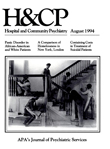Family Costs Associated With Severe Mental Illness and Substance Use
Abstract
The study's aim was to document the economic assistance in the form of money, in-kind contributions, and time spent in caregiving by families of adults with both severe mental illness and substance use disorders.
Methods: A total of 1l9 families of adults with dual disorders were compared with a similar group of 127 families whose adult children had no chronic illnesses. in telephone interviews, parents reported the amount of money, goods, and direct care family members gave to a designated adult child. Two methods were used to estimate the value of family time: opportunity costs, based on the average wage for production workers in the study area, and the cost of paid substitutes for the task being performed.
Results: Parents of adults with dual disorders reported that family members gave significantly more money and time to the adult child than did parents of adults with no chronic illnesses. The estimated value of family assistance in the dual disorder group was $9,703 using the opportunity-cost method and $13,891 using the substitution method, compared with costs of $2,421 and $3,547 for the group with no chronic illnesses.
Conclusions: Dual disorders impose a significant economic burden on families. Direct support that families provide to adult children with dual disorders should be considered carefully in treatment planning and policy decisions.
Access content
To read the fulltext, please use one of the options below to sign in or purchase access.- Personal login
- Institutional Login
- Sign in via OpenAthens
- Register for access
-
Please login/register if you wish to pair your device and check access availability.
Not a subscriber?
PsychiatryOnline subscription options offer access to the DSM-5 library, books, journals, CME, and patient resources. This all-in-one virtual library provides psychiatrists and mental health professionals with key resources for diagnosis, treatment, research, and professional development.
Need more help? PsychiatryOnline Customer Service may be reached by emailing [email protected] or by calling 800-368-5777 (in the U.S.) or 703-907-7322 (outside the U.S.).



